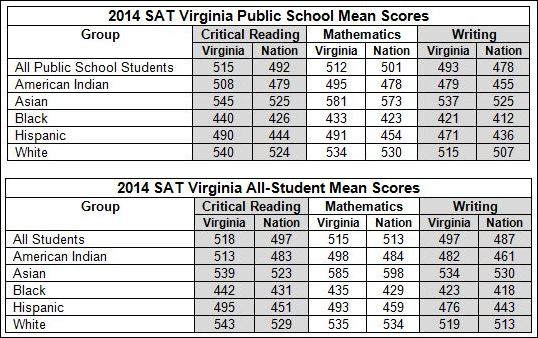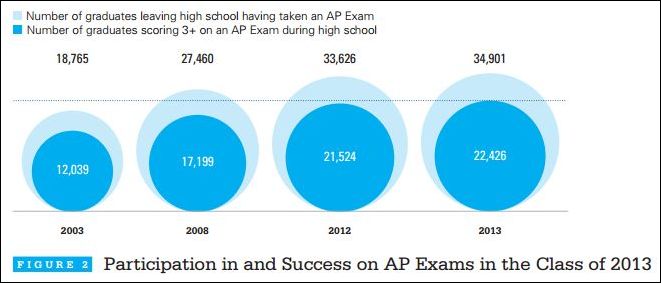Some good news about College Board SAT scores in Virginia to balance out the dismal news about Standard of Learning (SOL) pass rates: Public school students eked out gains in average SAT scores in 2014, continuing to outperform their counterparts nationally. Average public school reading scores improved by three points on the 200- to 800-point scale, while math scores gained a point and writing lost a point.
Virginia public school juniors and seniors ranked fourth nationally for the percentage (19.2%) earning a qualifying score (at least 3 out of 5) in one or more exams.
While Asians and whites continue to earn higher SAT scores on average, Virginia’s solid performance comes after years of steady expansion in the number of black, Hispanic and low-income students taking the exam. According to the College Board, 69% of Virginia public school graduates took the SAT in 2014.
Also, black and Hispanic students out-performed their peers nationally. Indeed, Virginia Hispanics out-performed Hispanics nationally by a wide margin, possibly reflecting the large concentration of Hispanic students in Northern Virginia, a region of that sets higher educational expectations and has one of the best educated populations of the entire country.
Forty-five percent of Virginia’s 2014 public school SAT takers achieved the College Board’s benchmark for college readiness, according to a Virginia Department of Education press release. The benchmark score of 1550 ( reading, mathematics and writing sections combined) indicates a 65% likelihood of achieving a B-minus grade-point average or higher during the first year of college. Nationwide, 42.6% of SAT takers met the readiness standard.
Bacon’s bottom line: Virginia’s population is bifurcating along educational lines. On the one hand, an increasing percentage of high school students are achieving college-ready standards. On the other, a large and intractable percentage are failing to meet basic standards of proficiency. To a large extent, K-12 educational achievement is economic destiny. As the economy increasingly rewards cognitive skills over manual skills, that divide will become more and more pronounced. Scary prospect.
— JAB




